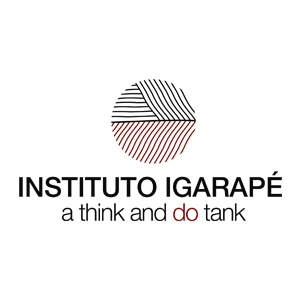Igarapé presents a contribution to the global mechanism for the protection of tropical forests.
Bulletin launched at COP28 details a simple and intuitive system to incentivize those who protect standing forests.
The study contributes to the debate brought about by the “Tropical Forests Forever” plan announced by the Brazilian government in Dubai.
The collective future, of people and the planet, depends on the preservation of the remaining tropical forests. Responsible for cooling the global temperature by at least 1°C, these forests house two-thirds of the world’s biodiversity and absorb 29% of annual CO2 emissions. The Global Futures Bulletin – International Financing Mechanism to Keep Forests Standing, launched by the Igarapé Institute at the United Nations Climate Change Conference 2023 (COP28) in Dubai, details a global system of incentives and compensation for individuals, entities, or states that protect standing forests, with resources coming from multiple sources – philanthropies, bilateral and multilateral funds, and institutional investors.
The Igarapé bulletin provides insights for the international discussion on a topic in which the Brazilian government took the lead at COP28, with the announcement of a financing model for countries that preserve their forests. “It’s important that countries with forests are the promoters of this mechanism so that it can truly become global,” says Ilona Szabó, co-founder, and president of Igarapé. “We want to contribute to Brazil propelling this financing model, aiming to provide fair compensation to counterbalance the opportunity costs associated with lawful and unlawful activities that threaten the forest.”
With the mechanism for forests, she asserts that it will be possible to develop similar models to benefit other ecosystems of great ecological value. The general principles of this bulletin were included among the recommendations released last April by the High-Level Advisory Board on Effective Multilateralism (HLAB) of the UN Secretary-General, of which Ilona is a member.
The Global Futures Bulletin explains that the mechanism complements carbon markets, compensating those actively conserving tropical forests based on payment per preserved hectare. According to the publication, incentives can be offered to individuals, public and private institutions, or countries. The system, simple and intuitive, begins with registration in an easily accessible record and verification through remote sensing. The compensation is annual, with severe penalties projected for each deforested hectare. Areas rich in biodiversity could receive an additional bonus to encourage conservation.
For financing, various sources are listed, such as synergies with multilateral organism programs, mixed financing platforms, and philanthropic funds.
As the bulletin shows, the world is at a favorable moment for the implementation of the mechanism, with various multilateral processes and political commitments – such as those that can result from this COP – signaling a growing dynamic toward the conservation and sustainable management of forests. With 59% of its territory covered by forests, Brazil, which will host COP30 in 2025 within the Amazon, emerges as a key player in the evolution of the global financial mechanism.
“Conserving tropical forests is not an option; it is a determination. Collective well-being is intrinsically linked to the health and sustainability of our ecosystems. Despite the challenges, international dynamism, especially with Brazil’s participation, provides reasons for optimism. We have the opportunity to channel this collective energy into practical actions. The urgency of the current climate crisis requires action if we want to ensure the future of our children and the next generations,” says Ilona Szabó.
Access the Global Futures Bulletin – International Financing Mechanism to Keep Forests Standing here:
Learn more about our participation in COP28.
More Information: raphael.lima@igarape.org.br /press@igarape.org.br / joao@pensatacom.com
Sobre o Instituto Igarapé
The Igarapé Institute is an independent think-and-do tank that conducts research, develops solutions, and establishes partnerships with the aim of influencing both public and corporate policies and practices in overcoming major global challenges. Our mission is to contribute to public, digital, and climate security in Brazil and worldwide. Igarapé is a non-profit and non-partisan institution based in Rio de Janeiro, operating from the local to the global level.



